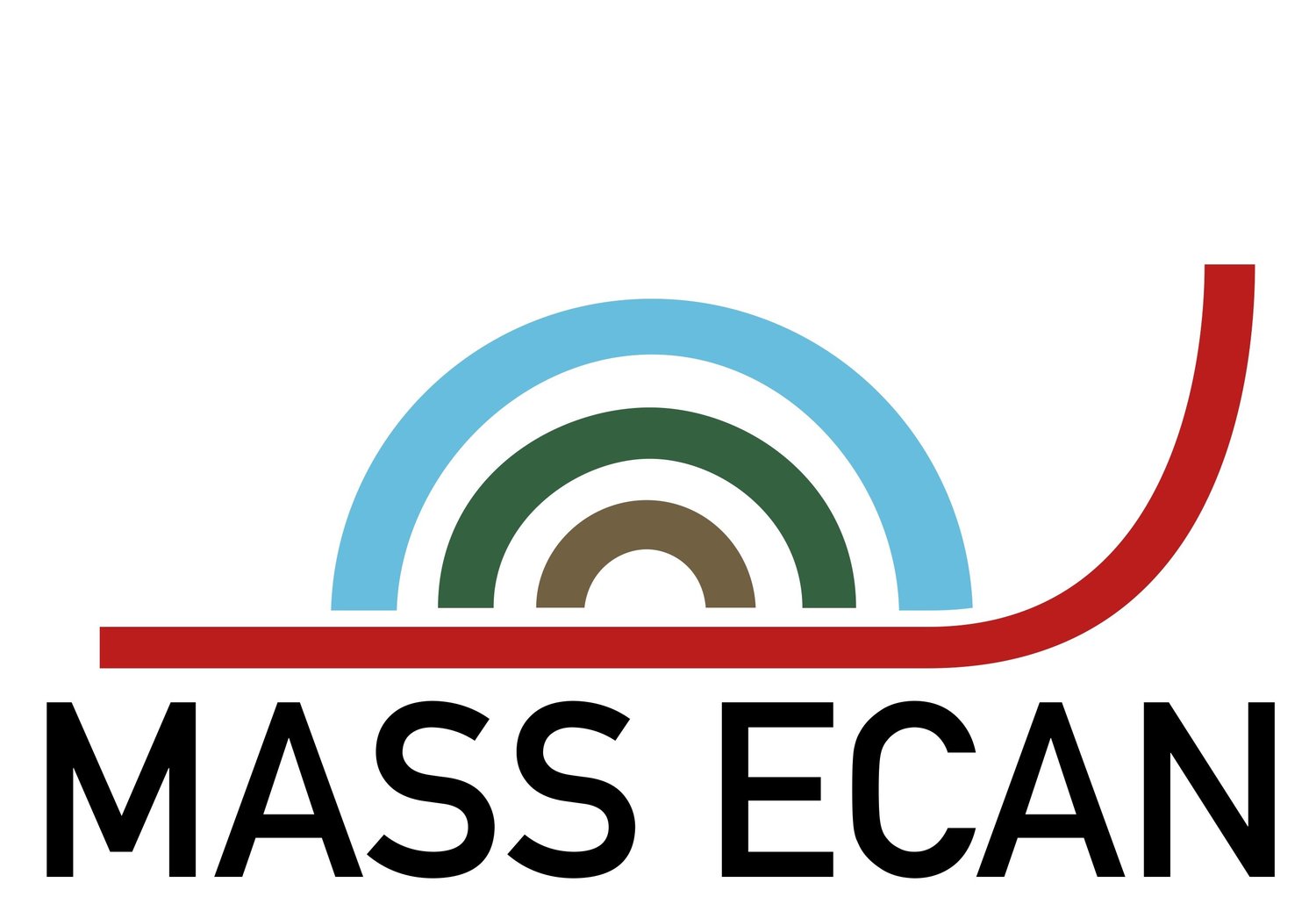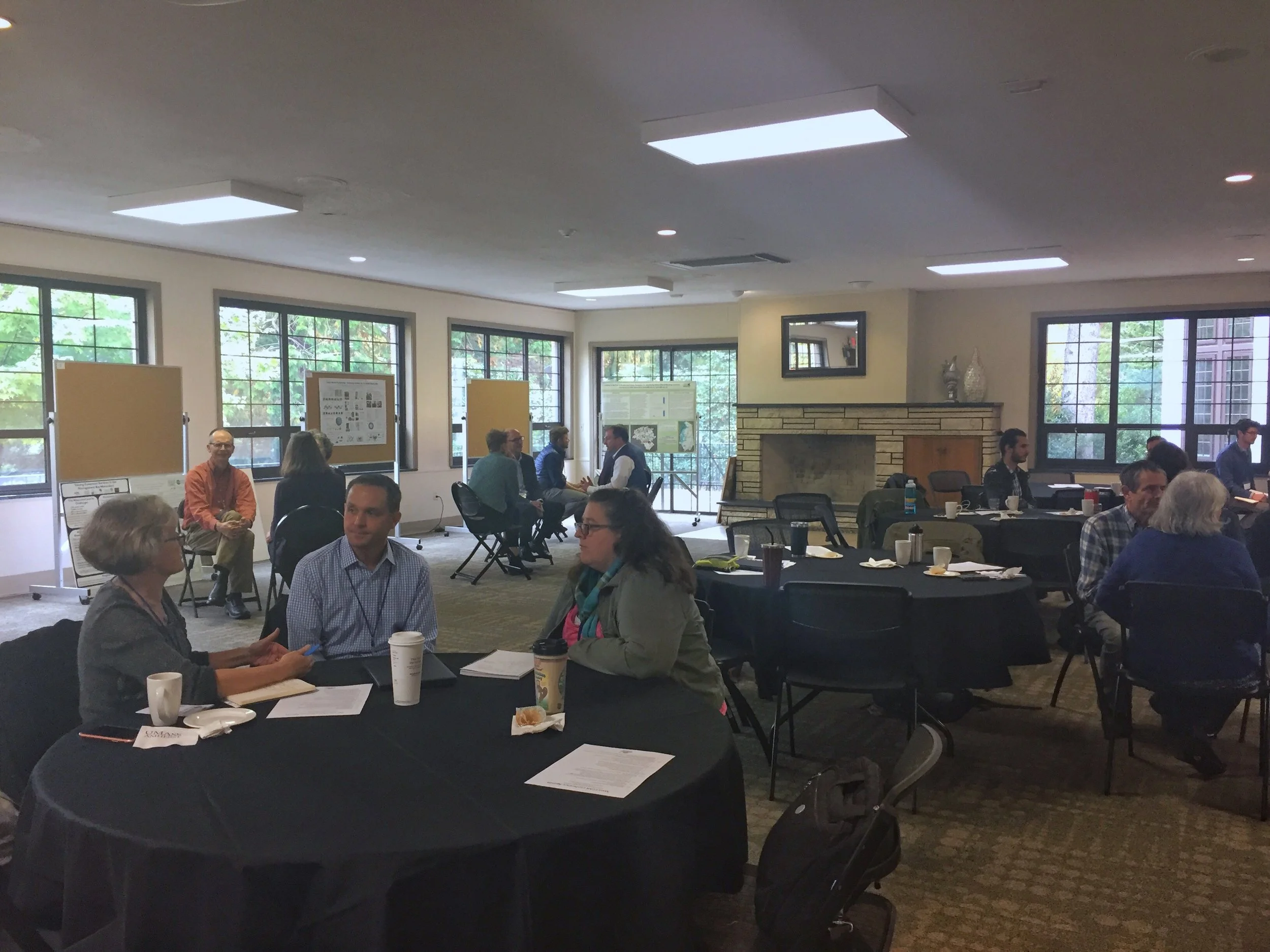Thank you to everyone who attended and supported our third annual Mass ECAN conference on October 29 at the Mt. Ida campus of UMass Amherst! We had a packed day of learning and networking with 80+ attendees from academia, non-profits, businesses, and state, federal, regional, and local agencies and boards. I was particularly impressed by attendees’ enthusiasm and willingness to participate this year!
With this conference, we’re creating space for you to learn about each other’s climate adaptation initiatives and to build community. Mass ECAN is committed to advancing climate adaptation through peer knowledge exchange and sharing of best practices and opportunities.
Over the day, we touched on a variety of ecosystem-relevant topics. You can catch up by reading the takeaways below (in order of the day) and checking out the presentations on our website.
Overview
· In founding Mass ECAN in 2017, we wanted to elevate ecosystem-level adaptation as part of the conversation in climate adaptation planning and action.
· Considering ecosystems is challenging because it requires more holistic thinking, working across mandates and missions of organizations and agencies.
· Ideally, adaptation actions provide co-benefits to both people and ecosystems.
· With Mass ECAN, we’re particularly interested in adaptation actions that help ecosystems.
o This includes actions that benefit ecosystems AND overlap with other benefits, such as to public health, infrastructure resilience, or food security. For great examples, just look to nature based solutions, which mimic natural processes to address natural hazards and enhance adaptation and mitigation. Functioning ecosystems contribute ecosystem services, like clean water and flood protection, that are critical to the health of human communities. As such, adaptation actions that reduce the impacts of climate change on ecosystems are also likely to have co-benefits for people.
o However, it’s also critical to consider adaptation actions that explicitly address vulnerabilities of species, natural communities, and entire ecosystems for their own sakes, such as protecting refugia for northern forest types or coldwater streams.
Opening remarks by Susanne Moser
· Susi summarized the state of the adaptation field (stemming from this report) and encouraged us to build the community and capacity we need to face adaptation challenges.
· To get our thoughts, she live-polled, including asking what has shaped the field and what we need to make a difference.
· “What do you most want from today’s gathering?” Our hopes as conference organizers were that attendees connected with peers, felt inspired by each other’s adaptation practices, reflected on their own work, and contributed to shaping what we do next together. This matched well with attendees’ hopes, with the most frequent responses to the poll being “connections,” “ideas,” “inspiration,” and “collaboration.”
EOEEA State Adaptation Initiatives
· Mia Mansfield, Director of Climate Adaptation & Resilience, provided remarks on recent efforts of the Executive Office of Energy & Environmental Affairs, including the latest updates on the recently launched Resilient MA Action Team’s efforts to implement actions from the State Hazard Mitigation and Climate Adaptation Plan.
· We learned about recent analyses and saw novel results on the incorporation of nature based solutions and natural resources-relevant priorities and actions in the Municipal Vulnerability Preparedness (MVP) Program.
· Speakers showcased great examples of nature based solutions and ecological restoration included in MVP Action Grant projects.
· We look forward to continued engagement in EOEEA initiatives. There is a role for this community of practice and our affiliated work groups to continue to contribute and provide expertise as EOEEA develops guidance, examples and case studies.
· In their own work, Mass ECAN members can also partner with municipalities, promote consideration of ecosystems in the MVP process, help implement priority actions from the State Plan, and be involved in stakeholder engagement.
Networking Activity
· We had dedicated networking time where participants enthusiastically engaged in a round-robin consultation activity to bond over shared challenges to their adaptation practice and seek advice from peers.
Strategies for Urban Ecosystems Resilience
· This session grew from interest last year in bringing an ecosystems approach to urban systems as something that’s challenging to do and not being done enough.
· We heard examples of how to consider ecosystem benefits of adaptation actions taken in urban areas and the importance of scaling up smaller efforts for more meaningful impact.
· This included restoring natural flows and storage in river systems, promoting habitat connectivity and wildlife movement, and using mapping tools to identify where to employ nature based solutions.
· We also considered if we could be doing more to engage and connect with peers in the environmental justice field, including an example of land trust efforts.
Expert Work Groups
· Our affiliated Expert Groups tackle adaptation issues requiring cross-organizational collaboration, including two new groups this year on “Slow the Flow” (river systems) and Forests, and continuing groups on Coldwater Streams, Mainstreaming Nature Based Solutions, Salt marshes, and Climate Communications.
· We heard about the latest efforts and considered where additional work is needed that we can accomplish through these work groups. We’ll be providing more details on groups soon and try to share more updates throughout the year.
Exploring Next Steps
· Towards the end of the day, we circled back to think about where to take Mass ECAN next.
· We’ll continue to grow and share adaptation opportunities, resources, and events through our newsletter. Invite your colleagues to join us!
· We’re considering convening mid-year in between conferences, such as in-person workshops on a particular topic or networking events.
· In the meantime, please always feel free to reach out with ideas or updates on your climate adaptation initiatives.
Poster Session
· New this year, we finished off the day with a poster session where presenters shared about their adaptation efforts over cookies and brownies. Visit the conference website to see the posters!
In your words
“The examples of projects people are already undertaking statewide were inspirational, and the opportunity to connect with others and explore potential collaborations was invaluable!” – Heidi Ricci, Mass Audubon
“I came away feeling a little bit more hopeful about the value and effectiveness of many small and large projects towards mitigating the climate crisis.” – Attendee, from conference evaluation
“The Mass ECAN conference is a wonderful convening of adaptation practitioners from all sectors and areas of expertise. I always learn so much, make great connections, and discover new opportunities to expand our impact as a field. Looking forward to next year already!” – Lauren de la Parra, Creative Climate Solutions
Thanks and hope to see you at next year’s conference!

